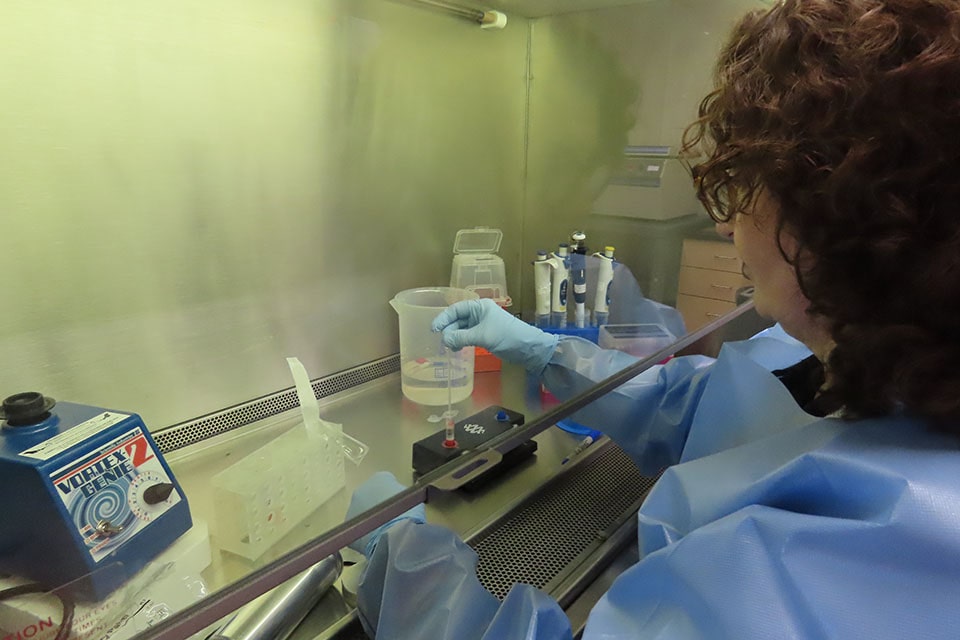NIH Taps SLU for Continued Vaccine Research
The National Institutes of Health (NIH) is continuing its 30-year run of funding vaccine research at Saint Louis University.
SLU once again has been selected to be among an elite group of research facilities that will investigate the vaccines and treatments for infectious diseases of tomorrow.
The National Institute of Allergy and Infectious Diseases (NIAID), which is part of the NIH, intends to provide approximately $29 million per year over seven years for nine Vaccine and Treatment Evaluation Units (VTEUs) around the country and a companion leadership group. SLU has been a VTEU member since 1989.
The new leadership group will be able to respond rapidly to public health emergencies by launching clinical trials and prioritizing vaccines and therapies to be studied in clinical trials.
Daniel Hoft, M.D., Ph.D., principal investigator of SLU’s VTEU and director of the division of infectious diseases at SLU, will serve on the scientific and operations governance committee of the leadership group as well as lead SLU’s vaccine research efforts.
“SLU’s Center for Vaccine Development is internationally recognized as a leader in the development of vaccines -- from the bench to the clinic,” Hoft said. “We are proud to be part of an unparalleled NIH consortium capable of urgently developing vaccines to protect the U.S. public and the world.”
We have incredible potential to revolutionize many fields of medicine.”
Daniel Hoft, M.D., Ph.D.
As a VTEU, SLU can conduct Phase 1 through 4 vaccine and treatment trials, including clinical studies in collaboration with partners from industry.
At its Extended Stay Research Unit, SLU can conduct human challenge trials, which are tightly controlled studies that expose healthy volunteers to infectious diseases such as influenza and malaria. SLU participated in a recent influenza human challenge study that studied how a person’s immune system responds to flu infection. Other human challenge studies will look at the ability of new vaccines, therapies and drugs to protect against infectious diseases.
SLU researchers have extensive experience developing vaccines and treatments for infectious diseases such as influenza, RSV, parainfluenza, tuberculosis, Zika, dengue fever, malaria and Chagas disease. Through research on pandemic influenza, smallpox, tularemia, anthrax and plague, they have been on the forefront of protecting the public from bioterrorism and other emergent threats. SLU’s work has supported the development and licensure of multiple vaccines that currently are in clinical use.
SLU’s vaccine research has wide support from the community. To recruit for its studies, SLU pulls from a database of more than 15,000 previous volunteers or those who have expressed interest in vaccine research.
“The community has been essential for us to be doing our work,” Hoft said. “We have had significant buy in to support our work with many area residents stepping up to participate in our research. They realize it’s important to develop new vaccines and therapies to protect the health of our community as well as the world.”
SLU’s research into vaccines and new treatments for infectious diseases will grow increasingly critical in protecting global health, Hoft said.
“Vaccines will continue to be an important area to protect the world against infectious diseases. At the same time, there will be continued growth in developing related immunotherapies that manipulate the human immune system to prevent cancer and treat autoimmune and allergic diseases. We have incredible potential to revolutionize many fields of medicine,” Hoft said.
SLU’s research is supported by grant 1 UM1 AI148685-01. Other VTEUs are Baylor College of Medicine in Houston, Texas; Cincinnati Children’s Hospital Medical Center in Cincinnati, Ohio; Emory University in Atlanta, Georgia; Kaiser Permanente Washington Health Research Institute in Seattle, Washington; University of Maryland School of Medicine in Baltimore, Maryland; University of Rochester in Rochester, New York; University of Washington in Seattle, Washington; and Vanderbilt University Medical Center in Nashville, Tennessee.
Established in 1836, Saint Louis University School of Medicine has the distinction of awarding the first medical degree west of the Mississippi River. The school educates physicians and biomedical scientists, conducts medical research, and provides health care on a local, national and international level. Research at the school seeks new cures and treatments in five key areas: infectious disease, liver disease, cancer, heart/lung disease, and aging and brain disorders.


















